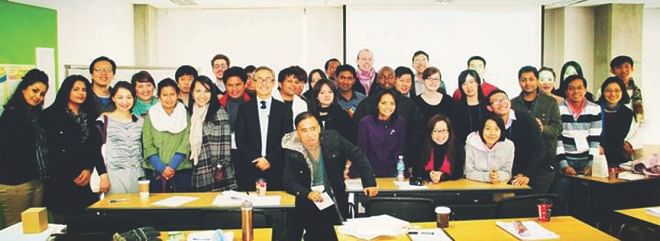Fostering Human Rights study

Recently I have got the opportunity to attend in an International Course on Human Rights and Asia organised by Seoul National University, Korea. This course was unique in the sense that it accumulated diverse voice of human rights dimensions from the participants of more than twenty countries of the World.
This two week intensive course intended to contemplate human rights jurisprudence with particular focus on the importance of Asian human rights mechanism to protect and promote human rights in this region. It was designed to enhance the ability to critically examine human rights issues in Asia by combination of lectures, presentations and discussions and visual aids. This forum offered both general sessions on the International human rights norms and human rights protection mechanism including UN Human Rights Institutions and Processes. Starting from basic understanding of human rights jurisprudence it course focused on Asian values and Human rights, Rule of Law and Human Rights, Cultural rights in Multi-cultural society with particular emphasis on Asian Context and Human Rights based approach to development. It also comprised thematic sessions on contemporary issues and case studies in Asia. Human rights experts including UN Special Rapporteurs who have wide-ranging experience of working in the field of human rights made lucid discussions throughout the course which facilitates the participants to learn human rights from various perspectives.
During the whole course participants attempted to examine the co-existence and clashes of human rights cultures as they impinge on human rights issues. Each Culture certainly has dynamic influence to understand human rights norms. However, if we look back to the development of human rights standards originated in 1948 it would be found that the concept of human rights secured universal recognition from its beginning.
Over the years human rights violations are perpetrated in each part of the world but universal reaction against these violations deserves utmost significance till date. The cultural context attached with the norms of human rights is adding significant values to contemplate human rights jurisprudence and at the same time to ensure and implement human rights with its pragmatic sense. The course which I have completed enlightened my human rights knowledge with particular context. It is to be noted that in order to stimulate the movement for the creation of human rights culture, the universal as well as contextual approach attached with human rights should be duly considered.
Though the Universalists stressed on the cooperation with each other in order to promote 'universal respect for' and observance of, human rights and fundamental freedoms for all without distinction but in reality are human rights really universal? Given the global prevalence of massive human rights violations, a negative answer seems to be warranted. In this backdrop the contextual approach to human rights deserves to be attended.
It is worth mentioning that the concept of human rights is closely associated with specific social, political, and economic conditions and the specific history, culture and values of a particular country. Different historical stages have different human rights requirements. Countries at different development stages or with different historical traditions and cultural backgrounds also have different understanding and practice of human rights. Participants of the aforesaid course while analysing the context of each countries in terms of understanding and realising human rights concluded that we cannot think of a unique model or standard of human rights in certain countries. It is not feasible to compel all the other countries to comply with the standards of a specific country rather it is the specific context of a particular country which would decide the standard of human rights.
The course which I have undertaken has enlightened me on the point that we have failed to underscore the importance of our specific context and values in terms of understanding the jurisprudence of human rights with its pragmatic essence.
Coming to the point of Bangladesh which was born with a view to ensure true emancipation from exploitation and victimisation but unfortunately after 42 years of independence we are still live in a society devoid of human rights.
While this is an evident truth that we have signed and ratified number of International Human Rights instruments but unfortunately the reality suggests a horrifying picture of human rights realisation. Here it is to be noted that states including Bangladesh are expressing commitments for protecting and promoting human rights in the International forum/arena but in the domestic level states are often found to act as perpetrators while restricting and manipulating human rights entitlements.
In this backdrop Human Rights education demands immediate attention to be incorporated in our nation education curricula. By virtue of human rights education (not in terms of quantity but ensuring quality) we can make people more aware about human rights which would enrich their capability to hold the state accountable and compel as well to ensure their entitlements.
THE WRITER IS LAW DESK ASSOCIATE

 For all latest news, follow The Daily Star's Google News channel.
For all latest news, follow The Daily Star's Google News channel. 



Comments